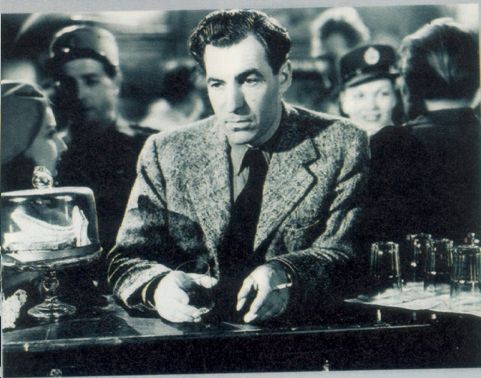Submitted by
Adriana Larkin
The league of gentlemen
Did the post-war British feature reveal a crisis in masculinity?
British cinema from the late 1940s to early 1960s - from the last gasp of the 'Golden Age' to the advent of 'kitchen sink' - has often been seen as dominated by Rank-sponsored repression, spewing forth endless films in which can-do chaps like Kenneth More and Jack Hawkins set the tone for a conservative national cinema crying out for a good kick up the backside from Lindsay Anderson. Interesting, then, that a crop of DVD releases from the period should throw up a number of films that interrogate the very nature of British masculinity; films made, not by the angry young men, but by seasoned industry veterans.
After Powell and Pressburger's extravagant Technicolor experiments in Black Narcissus and The Red Shoes, the starkly monochromatic (and virtually musicless) The Small Back Room (Warner, £12.99) comes as something of a shock. It's a treatment, though, that perfectly suits the film's psychological trajectory, as it follows Sammy Rice, one of WWII's backroom boys, through painful battles with alcoholism, emotional paralysis and an artificial limb; it's a tangle of linked dysfunctions which can only be unpicked in the film's unbearably tense climax, where Sammy has to overcome physical and psychological handicaps in the weird setting of Dorset's Chesil beach.
Such a picture of British manhood in extreme crisis was a rare thing at the time. Lewis Milestone's 1953 They Who Dare (Warner, £12.99), by contrast, is a typical mid-50s war film, the story of an SAS raid on Greece with its emphasis on teamwork and professionalism. It is interesting, though, for its male lead, Dirk Bogarde, whose career as a '50s star forms one of the most fascinating representations of masculinity in British cinema.
Bogarde joined Powell and Pressburger for their final collaboration as The Archers, 1957's unjustly neglected Ill Met by Moonlight (Carlton, £12.99), which finds him (three years after They Who Dare) back on Grecian soil in yet another war movie. This - the true story of Patrick Leigh-Fermor and Bill Moss's kidnapping of a German general on Crete - is, like previous Archers films, as much concerned with eccentricity as heroism, from Bogarde's camp, Byronic posing to the Cretan community itself (which is celebrated in much the same vein as the Scots of I Know Where I'm Going or the Shropshire peasantry of Gone to Earth). Where the rugged landscapes of They Who Dare are purely functional, forming a suitably rugged setting for acts of male bravery and bonding, Ill Met's gorgeous monochrome Crete, as shot by Archers regular Christopher Challis, is a quite fantastic midsummer night's dream of moonbeams and fog, as capricious, fleeting and ungraspable as the puckish Bogarde himself, and a magical background for the derring-do.
Basil Dearden and Michael Relph's The League of Gentlemen (Carlton, £12.99) is a much more 'modern' film, fascinatingly on the cusp of the 1960s, in which good old Jack Hawkins (a million miles from The Cruel Sea) leads a gang of ex-military men adrift in peacetime (including Dickie Attenborough and Roger Livesey) in a bizarrely misogynistic and virtually homoerotic heist movie. Surprisingly frank about sex, League is a comic study of the British male caught up in social change, and has some strange, and disturbingly dark undercurrents.
The director/producer team of Dearden and Relph had emerged at Ealing Studios, and League demonstrated that while the pair had maintained their passion for a (comic) cinema driven by social issues, they had travelled some way from Ealing's rather cosy consensus. Their next project was 1961's Victim (Carlton, £12.99), in which Dirk Bogarde finally pressed the self-destruct button on his career as a Rank matinee idol with his powerful portrayal of a closeted gay barrister being blackmailed. Along with the 1957 Wolfenden Report, Victim was the key text in liberalising both the laws concerning, and attitudes to, homosexuality in Britain. It was also, perhaps, the era's most extreme deconstruction of traditional manhood, and (despite its dated patronising of gays) is still a brave and moving film.
David Sutton
© Fortean Times, July 2004
Back to index


